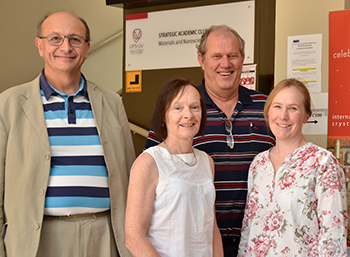Latest News Archive
Please select Category, Year, and then Month to display items
12 January 2024
|
Story Nonsindiswe Qwabe
|
Photo Sonia Small
 Since joining the UFS in 2008, Dr Grey Magaiza has worked extensively on approaches that can foster the socio-economic transformation of societies.
Since joining the UFS in 2008, Dr Grey Magaiza has worked extensively on approaches that can foster the socio-economic transformation of societies.
“The future should be one where communities can decide on their development agenda and futures. That’s the most important for me.” Dr Grey Magaiza, Deputy Director of the Centre for Gender and Africa Studies (CGAS) and Head of the Community Development programme on the Qwaqwa Campus, is passionate about capacitating communities to be agents of change and advancement. His vision for the future emphasises the empowerment of communities to take charge of their development by actively participating in decision making and the implementation of development projects that can improve their lives.
Since joining the UFS in 2008, Dr Magaiza has worked extensively on approaches that can foster the socio-economic transformation of societies. Over the years, he has crafted his research speciality into one that he is most proud of – being an interdisciplinary scientist immersed in the development of communities.
“I’m in a fortunate position of researching what I like. I say ‘fortunate’, because I’ve taken the time to understand what I’m passionate about, which is the overall field of rural livelihoods and livelihood futures – in short, community development. My research starts from an engaged university, understanding the elements that a university must use to enhance transformation and relevance to its immediate community in terms of development.”
One of the ways he has done this is by looking at social entrepreneurship as a development approach for young people in a rural setting. Through workshops with non-profit and civic organisations in Qwaqwa, Dr Magaiza has been helping these organisations to map out their needs and actively meet them through the involvement and support of external role players.
“We understand that communities are part of the national development agenda, but even that national agenda respects community knowledge and intentions and allows communities to shape their identity. A critical enabler of this is community organising. You bring back the capacity in communities to have dialogues on issues affecting them as spaces for engagement, knowledge exchange, and for people to just talk about their way forward.”
By enabling communities to define their development agenda, they can address their specific needs, challenges, and aspirations, he said. “When I look at livelihood futures, it’s quite an exciting aspect of my work – it’s like looking into a fortune tellers’ globe, because you’re not deciding for communities what they should do, but the communities themselves take those decisions.”
Prestige Scholar hosts Prof John Helliwell of Manchester University
2015-12-08

From left is Prof John R. Helliwell (School of Chemistry, University of Manchester), Dr Madeleine Helliwell (School of Chemistry, University of Manchester), Prof Andre Roodt (Department of Chemistry, University of the Free State) and Dr Alice Brink (Department of Chemistry, University of the Free State).
Photo: Steven Collett |
At the invitation of Dr Alice Brink of the Department of Chemistry, Prof John Helliwell, the 2015 Max Perutz Prize winner, and his wife, Dr Madeleine Helliwell, visited the University of the Free State (UFS).
The Helliwells, both chemists of note, took part in a series of lectures and exchanges on the Bloemfontein and Qwaqwa Campuses.
This visit from 9-19 November 2015 was the consequence of Dr Brink’s participation in the Vice-Chancellor’s Prestige Scholars Programme (PSP) initiative to encourage the broadening of the international footprint of the next generation of scholars in the academy.
Two year collaboration
Dr Brink and Prof Helliwell from Manchester University have a standing collaboration going back two years. Dr Brink, an NRF Thuthuka grant holder and a member of the PSP since 2013, has spent almost eight months in Manchester, collaborating with Prof Helliwell on her study of the successful interaction of rhenium tricarbonyl complexes with proteins determined via protein crystallography.
Their collaboration resulted from the close association of Prof Helliwell and Prof Andre Roodt from the UFS Department of Chemistry, both former presidents of the European Crystallographic Association.
Sharing academic expertise
Prof Helliwell, the 2014 American Crystallographic Association Patterson Award winner for his “pioneering contributions to the global development of the instrumentation, methods and applications of synchrotron radiation in macromolecular crystallography”, gave three lectures in the Department of Chemistry, two on the Boemfontein Campus, and the other on the Qwaqwa Campus on 13 November 2015.
Dr Helliwell, former co-editor of the Acta Crystallographica Section C: Crystal Structure Communications journal, consulted with postgraduate students from the Departments of Chemistry and Biochemistry.